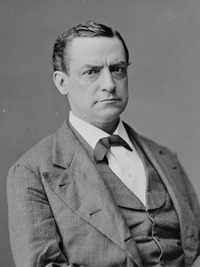Samuel Jackson Randall
| Samuel J. Randall | |
|---|---|
 |
|
| 29th Speaker of the United States House of Representatives | |
|
In office December 4, 1876 – March 4, 1881 |
|
| President |
Ulysses S. Grant Rutherford B. Hayes James A. Garfield |
| Preceded by | Michael C. Kerr |
| Succeeded by | J. Warren Keifer |
| Member of U.S. House of Representatives from Pennsylvania's 1st & 3rd districts |
|
|
In office March 4, 1863 – March 3, 1875 (1st) March 4, 1875 – April 13, 1890 (3rd) |
|
| Preceded by |
William E. Lehman Leonard Myers |
| Succeeded by |
Chapman Freeman Richard Vaux |
| Member of the Pennsylvania Senate | |
|
In office 1860-1863 |
|
| Personal details | |
| Born |
Samuel Jackson Randall October 10, 1828 Philadelphia, Pennsylvania, United States |
| Died | April 13, 1890 (aged 61) Washington, D.C., United States |
| Nationality | United States |
| Political party | Whig, Democratic |
| Spouse(s) | Fannie Agnes Ward |
| Parents | Josiah Randall and Ann Worrell Randall |
| Occupation | Politician |
| Religion | Presbyterian |
| Signature | |
Samuel Jackson Randall (October 10, 1828 – April 13, 1890) was a Democratic member of the United States House of Representatives from Pennsylvania in the late 19th century. He served as the 29th Speaker of the House and was twice a contender for his party's nomination for President of the United States.
Born in Philadelphia to a family active in Whig politics, Randall shifted to the Democratic Party after the Whigs' demise. His rise in politics began in the 1850s with election to the Philadelphia Common Council and then to the Pennsylvania State Senate. Randall served in a Union cavalry unit in the American Civil War before winning a seat in the federal House of Representatives in 1862. He was reelected every two years thereafter until his death. The representative of an industrial region, Randall became known as a staunch defender of protective tariffs designed to assist domestic producers of manufactured goods. While often siding with Republicans on tariff issues, he differed with them in his resistance to Reconstruction and the growth of federal power.
Randall's defense of smaller, less centralized government raised his profile among House Democrats, and they elevated him to Speaker in 1876. He held that post until the Democrats lost control of the House in 1881, and was considered a possible nominee for President in 1880 and 1884. Randall's support for high tariffs began to alienate him from most Democrats, and when that party regained control of the House in 1883, he was denied another term as Speaker. Randall continued to serve in Congress as head of the Appropriations Committee. He remained a respected party leader, but gradually lost influence as the Democrats became more firmly wedded to free trade. Worsening health also curtailed his power until his death in 1890.
...
Wikipedia
